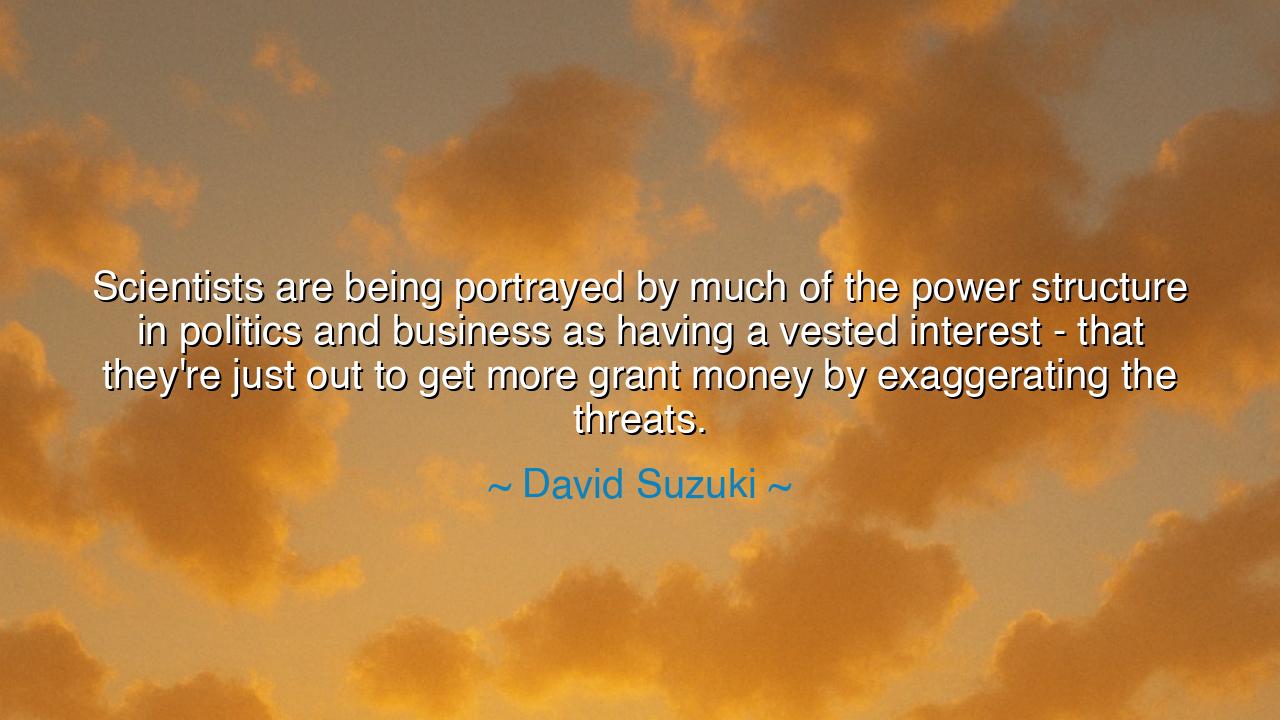
Scientists are being portrayed by much of the power structure in
Scientists are being portrayed by much of the power structure in politics and business as having a vested interest - that they're just out to get more grant money by exaggerating the threats.






Truth is often the first casualty when power and profit are threatened. When David Suzuki declared, “Scientists are being portrayed by much of the power structure in politics and business as having a vested interest—that they're just out to get more grant money by exaggerating the threats,” he spoke of a battle as old as civilization itself: the struggle between those who seek knowledge for the good of all and those who twist truth to preserve their own dominance. His words reveal the deep tension between science, which seeks to uncover reality, and political and economic forces, which often seek to conceal it.
At the heart of Suzuki’s statement lies the tragic misrepresentation of scientists. Rather than being seen as guardians of truth, they are cast as self-serving opportunists, accused of spreading fear to secure wealth and influence. This narrative is not accidental—it is crafted by powerful groups whose interests are threatened by the truths that science reveals. When researchers warn of climate change, environmental destruction, or public health crises, they challenge the profits of industries and the stability of political empires. To silence them, these forces sow doubt, convincing the public that the messengers themselves are corrupt.
History offers many dark echoes of this pattern. In the early 20th century, tobacco companies deliberately denied the link between smoking and lung cancer. When courageous scientists presented evidence of harm, these corporations attacked their integrity, accusing them of exaggeration to gain attention or funding. For decades, this deception delayed action, costing millions of lives. Similarly, in the modern era, oil and energy companies have used similar tactics against climate scientists, framing them as alarmists rather than truth-tellers. These battles reveal how easily truth can be clouded when powerful interests manipulate public perception.
Suzuki’s warning also speaks to the fragility of trust. When scientists are vilified, the bond between knowledge and society begins to break. Ordinary citizens, confused by conflicting messages, may turn away from evidence altogether. This erosion of trust can lead to catastrophe. Consider the COVID-19 pandemic, when public health experts were often attacked or dismissed, and lifesaving measures were delayed because political leaders framed scientific warnings as conspiracies. In such moments, the cost of doubting truth is measured in human lives.
Yet, there is hope in this struggle. Throughout history, truth has ultimately risen from beneath the weight of lies. Figures like Galileo Galilei, who was condemned by the Church for his discoveries, or Rachel Carson, who exposed the dangers of pesticides despite fierce opposition, remind us that courage in science can overcome even the most powerful foes. Their victories were hard-won, but they laid the groundwork for progress and protection of future generations.
Let this wisdom be carried forward: those who hold power may always seek to distort reality, but the duty of science is to persist, to speak truth even when it is dangerous. As Suzuki’s words remind us, the public must learn to discern the motives of those who attack knowledge. For when truth is silenced, ignorance reigns, and the very future of humanity hangs in the balance. Only by defending those who reveal the threats we face can we hope to build a world guided by light rather than shadow.






TTDat Truong Tien
Suzuki’s quote brings up an uncomfortable truth about how science is sometimes viewed in today’s political climate. Is it possible that the financial interests of the business world have led to this portrayal of scientists as opportunists? How much does this affect the progress of important scientific research? Could there be a better way to bridge the gap between scientific integrity and the realities of funding in research?
ADNguyen Ngoc Anh Duong
It’s troubling when scientists are painted as having selfish motives, especially when the issues they’re addressing are critical for society’s future. If scientists are genuinely trying to highlight pressing threats, why is there such a pushback? Do you think this skepticism toward scientists is growing due to political agendas, or is it part of a broader distrust in institutions? How can scientists combat this perception?
MTLe Duong Mai Thy
David Suzuki’s point is eye-opening. It’s frustrating when scientists are accused of exaggerating issues to keep the funding flowing. Could this be a result of how science and politics are intertwined, or do scientists need to work harder to prove their motives are truly for the greater good? Is there a way to regain public trust without seeming defensive or dismissive of concerns about funding?
LTQuynh nhu Le thi
This quote really hits on an issue I've noticed. It seems that the public’s trust in scientists is often undermined by the narrative that they are just in it for the money. Is this a reflection of society’s skepticism toward experts, or is there some truth to the idea that research can be skewed to secure funding? Can scientists still maintain their integrity when politics and business are involved?